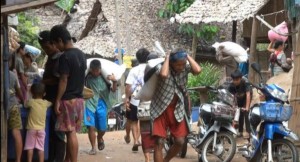Food rations for refugees living in the seven refugee camps on the Thai border will be reduced due to funding cuts by international aid organizations. Refugees will get reduced food rations from November 2013. In an exclusive interview with Karen News refugees tell how they will cope with less food.
 Saw Roger, now in his 60’s has been a Mae La camp resident since 1995 and told Karen News that if his food rations are reduced he will struggle to feed his family of four.
Saw Roger, now in his 60’s has been a Mae La camp resident since 1995 and told Karen News that if his food rations are reduced he will struggle to feed his family of four.
“If the rations continue to be distributed like before, I have no problems with that. However, if they decrease [our food] it will cause problems for my family. My family currently gets enough rations each month to satisfy our needs so I don’t need to worry now. But if the rations were to decrease I would face real problems, just like everyone else.”
Daw Tin Tin, a mother of three children now living at Mae La refugee camp explains that she finds it tough to feed her child on the current food ration now given to her family.
“We get 12 kilograms of rice for each person, but now we’ve heard that will be less. We are not happy about this. However, we can’t do anything; we will wait to hear what our leaders say about this. My food rations for my children are not enough and my food ration is not enough.”
Daw Tin Tin, 59, said the proposed food cuts are a big worry for her and she will have to start to forage in the jungle to supplement her food supply.
“We don’t want our food ration to be reduced. We want to get the same amount as we can still cope on that amount. We can’t do anything about not having enough food – we will need to find a way to solve this. We need to pick vegetables and fruits, or get wild fruits from the forest and sell them to supplement our food ration.”
Daw Tin Tin said that many refugees in the camp do not know why their rations are being cut.
“We don’t know if TBC [aid agency] is receiving less support, but we heard that they said they‘re receiving less support from other countries so they have to decrease our rations. The second thing we think is that it’s maybe linked to the political situation.”
Daw Tin Tin said she looked to her Karen leaders to fight on behalf of her and the other refugees.
“I want to tell our leaders to monitor the situation of our people with open eyes. We want them to identify our real difficulties, our problems and raise them. Nowadays we are facing real food problems so they [refugee authorities] should find the best way to deal with this honestly. I appeal to them to help us.”
Pu Aye Kyi, 70, who has a family of seven and has lived at Mae La refugee camp since 2007 said that if the rations cuts are equal it will easier for refugees to take.
“If they reduce the rations for everybody, it’s not a problem. However, if they decrease some people’s rations and not others, or if they distribute them to some and not others, it would not be fair. I won’t accept this. But we can’t do anything if they decide they should give people different rations or distribute them in a certain way. To me, if this is order from our leaders, I will accept everything. If food aid is not enough, reduce it for everyone as we are the same refugees.”
Saw Bu Kyi, a Mae La Camp resident said refugees lives were hard enough without the added burden of having to live on less food.
“The decrease in food rations is not fair. Even with full food ration, our Karen people do not eat like other people. Although when food ration was distributed in fully, it was not enough for some people. If they get one can [300gms of rice] for a meal, they eat more than one can. So, they will have to find their food from other places to maintain their needs. If there is a decrease there will be more and more difficulties. The best thing for them to do is to distribute the food just as before.”
In a media statement released on the 18 September, The Border Consortium, who is responsible for the delivery of humanitarian aid to the 129,787 refugees from Burma now living in Thailand, said.
“Rice rations are being revised in refugee camps in Thailand following reductions in funding for humanitarian food aid and a transition to needs-based and community-managed humanitarian relief.”
The TBC said that households would be “categorised by community committees as ‘Most Vulnerable,’ ‘Vulnerable,’ ‘Standard,’ and ‘Self Reliant’. Households categorised as ‘Most Vulnerable’ will receive an increase in rations, ‘Vulnerable’ households will maintain their current level of assistance, ‘Standard’ will see a change in the rice provided for adults, and ‘Self Reliant’ households will no longer receive food assistance for adults over 18 years old.”
Saw Eh Thoo, 28, single and living at the Mae La Refugee Camp since 2006 said that the rations cuts will mean that many refugees would go hungry.
“In previous years such as in 2007-2009 there was enough food because they distributed one tin [16kg] to every person. But now they will decrease the amount to 12 kilograms or even to 8 kilograms so there will be real difficulties. The 12 kilograms is equals to 30 small cans but most adults will eat one can in the morning and one in the evening so the rations are not enough. It is not enough it will be gone before the end of the month.”



